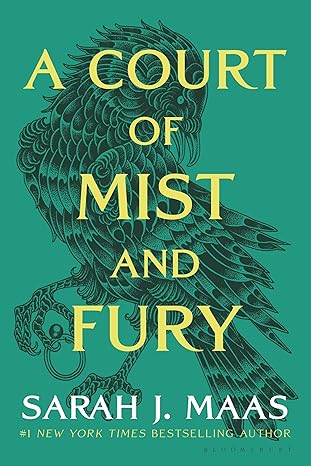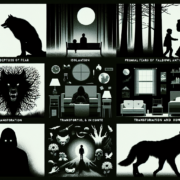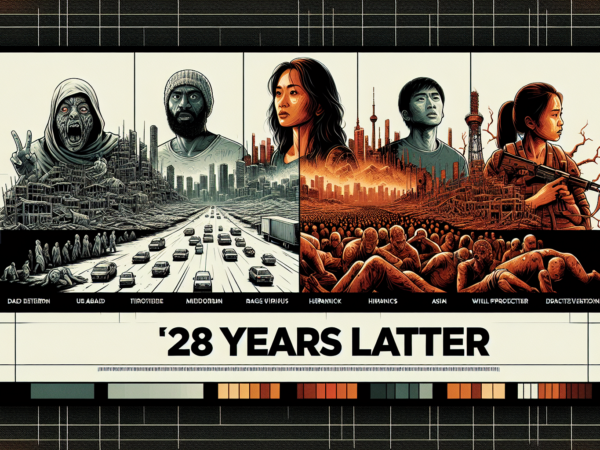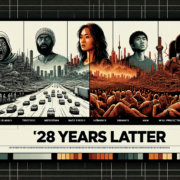Navigating the Film Industry: Insights from Craig Caton-Largent

Craig Caton-Largent, a veteran visual effects artist, shares his journey and insights into the film industry, from his childhood dreams of monster-making to the challenges of breaking in today. This blog explores his experiences, advice for aspiring filmmakers, and the importance of networking in a competitive landscape.
Table of Contents
- The Early Inspiration
- From Dreams to Reality: Education and Career Start
- The Changing Landscape of the Film Industry
- The Golden Age of Monsters
- Passion and Competition: A Double-Edged Sword
- Building Confidence in Students
- Networking: The Key to Success
- The Art of Casual Networking
- The Value of Internships: A Practical Approach
- Real-World Experience: Bridging Classroom Learning
- FAQ: Common Questions about Breaking into Film
The Early Inspiration
Craig Caton-Largent’s fascination with monsters began in childhood. He was captivated by the original Planet of the Apes movie, which sparked an early desire to create and embody characters. This passion led him to a monster makeup handbook from Famous Monsters of Filmland, where he learned the art of transformation.
By the fifth grade, Craig was determined to pursue a career in monster-making. Despite his mother’s concerns about the feasibility of such a dream, he focused on honing his skills. The joy of becoming another character through makeup fueled his ambition, setting the stage for his future in the film industry.

From Dreams to Reality: Education and Career Start
Initially, Craig’s journey took an unexpected turn. He enrolled in a community resource training program during high school, where he worked in a local hospital’s X-ray department. This experience, while unrelated to film, introduced him to anatomy and physiology—knowledge he deemed beneficial for monster-making.

After becoming an X-ray technologist, he moved to Los Angeles. Just two weeks later, he landed a job on Metal Storm: The Destruction of Jared-Syn. This pivotal moment marked his transition from dreams to a tangible career in the film industry.
The Changing Landscape of the Film Industry
The film industry has evolved dramatically since Craig’s entry in the 1980s. Today, aspiring filmmakers face a landscape saturated with competition and advanced technology. While the tools for learning have expanded, so have the number of individuals vying for similar opportunities.

Craig reflects on how easier it was to break into the industry back then, with fewer aspiring monster makers. Now, thousands apply for positions that once attracted only a handful, making persistence and creativity essential for success.

The Golden Age of Monsters
The 1980s are often referred to as the Golden Age of Monsters, a time when practical effects were in high demand. Craig was fortunate to emerge in this era, where innovation was key. He and his contemporaries explored uncharted territory in creature design, leading to a flourishing career.
This period allowed artists like Craig to thrive. With a community of passionate creators, they pushed the boundaries of visual effects, crafting memorable monsters that captivated audiences.

Passion and Competition: A Double-Edged Sword
Passion drives many in the film industry, acting as a powerful motivator. However, competition can be both inspiring and intimidating. Craig believes that healthy competition encourages creativity, pushing individuals to elevate their craft and innovate.

While some may shy away from competition, it can also serve as a catalyst for growth. Craig emphasizes the importance of balancing confidence with skill, encouraging his students to embrace challenges as opportunities for improvement.

Building Confidence in Students
One of Craig’s key roles as an educator is to instill confidence in his students. He recognizes that many talented individuals struggle with self-doubt. By fostering an environment where students feel empowered, he helps them align their skills with their aspirations.

Craig employs various techniques to boost confidence, ensuring that students believe in their capabilities. As they develop their skills, he encourages them to take risks and embrace their unique artistic voices.
Networking: The Key to Success
Networking is often cited as the most critical factor in breaking into the film industry. It’s not just about who you know but also about how you connect with them. Building relationships can open doors to opportunities that may otherwise remain closed.

Craig emphasizes that most jobs in the entertainment business come through connections. Engaging with peers, mentors, and industry professionals can lead to collaborations and job offers. It’s essential to cultivate these relationships genuinely, as they can be pivotal in shaping your career.

One effective way to network is by participating in industry events. These gatherings provide a relaxed atmosphere to meet others and exchange ideas. Remember, it’s not just about pitching your projects; it’s about establishing rapport and sharing experiences.

The Art of Casual Networking
Casual networking is an art that many overlook. It’s about creating an environment where conversations flow naturally without the pressure of business agendas. Craig suggests that the best connections happen when you’re simply enjoying a conversation.

When initiating a conversation, focus on common interests rather than jumping straight into business. Ask questions, listen actively, and share your experiences. This approach fosters genuine connections, making it easier for others to remember you when opportunities arise.

Moreover, follow up after meeting someone. A simple message expressing gratitude for the conversation can leave a lasting impression. It shows that you value the connection and are interested in maintaining it.

The Value of Internships: A Practical Approach
Internships are invaluable for gaining practical experience in the film industry. They provide hands-on exposure to the workings of production and allow aspiring filmmakers to apply their classroom knowledge in real-world settings.
Craig advocates for short-term internships, ideally lasting a few months. This duration allows both the intern and the employer to assess compatibility without a long-term commitment. It’s an efficient way to determine if the internship is mutually beneficial.
While unpaid internships can be controversial, Craig believes they can be worthwhile if structured correctly. The key is to ensure that the experience is educational and beneficial for the intern. Learning from industry professionals can provide insights and skills that are difficult to acquire in a classroom.

Real-World Experience: Bridging Classroom Learning
Real-world experience is essential for bridging the gap between theory and practice. In film, the challenges encountered on set can differ significantly from what is taught in textbooks. Craig highlights the importance of tackling these challenges head-on during internships.
Interns often face unique problems that require quick thinking and adaptability. By navigating these situations, they learn valuable problem-solving skills that enhance their readiness for future roles in the industry.

Additionally, internships foster collaboration with diverse teams. Working alongside professionals from various backgrounds enriches the learning experience and prepares interns for the collaborative nature of film production.
FAQ: Common Questions about Breaking into Film
What skills are essential for success in the film industry?
Essential skills include creativity, communication, and technical proficiency. Being adaptable and willing to learn continuously is also crucial in this ever-evolving industry.

How can I find internship opportunities?
Internship opportunities can be found through networking, online job boards, and industry-specific websites. Attending film festivals and networking events can also lead to internship offers.
Is it necessary to have a degree in film to succeed?
While a degree can be beneficial, it is not mandatory. Many successful professionals in the industry have diverse educational backgrounds. Practical experience and a strong portfolio often carry more weight.

How important is it to have a mentor?
A mentor can provide guidance, support, and valuable industry insights. Having someone with experience can help you navigate the complexities of the film industry more effectively.

What should I do if I face rejection?
Rejection is a common part of the industry. It’s essential to view it as a learning opportunity. Seek constructive feedback and continue to refine your skills and network.



























